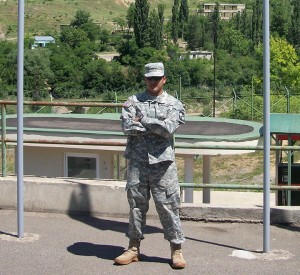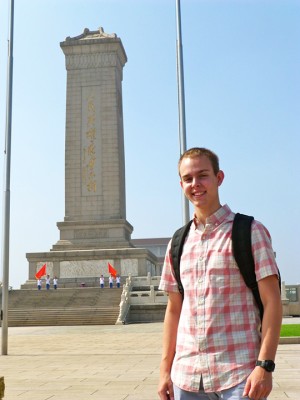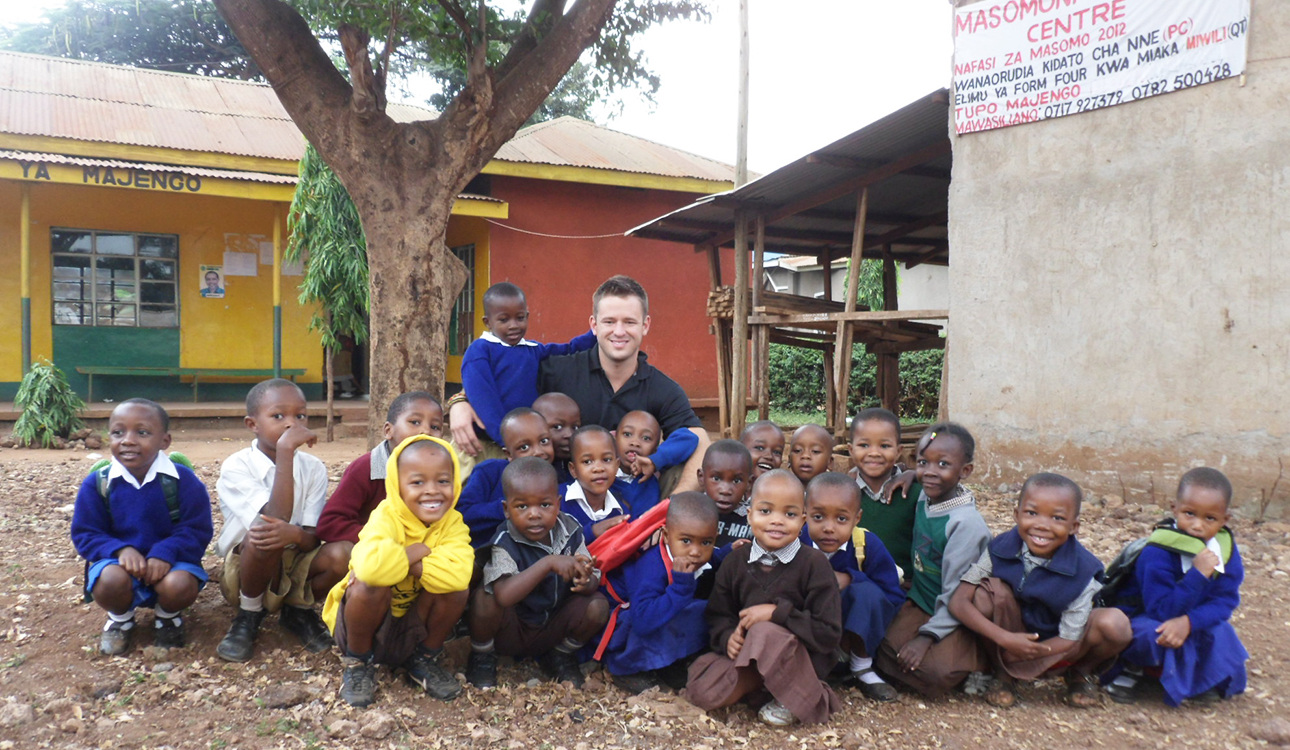
Cadet Zeke Rangel stands in front of the basic mountain training summer course in the Republic of Georgia.
By Jessica Chia
Reporter
Four Baylor Army ROTC cadets are readjusting to being home after spending the summer overseas as part of a military-education training program.
GEORGIA
San Antonio junior Cadet Zeke Rangel was enrolled in a military-to-military contact deployment training program with the Republic of Georgia’s army in Sachkhere, Georgia. Rangel graduated fourth in his class, which was made up of cadets from several American universities.
“It was very physically demanding and mentally challenging,” Rangel said. “Marching through the mountains with 50 pounds for nine hours in one day, the next day, eight hours. They only allow two liters of water.”
Skills in climbing, ascending, descending, overcoming an obstacle path and making knots were criteria for completion of the program.
The June training camp was approved by NATO’s Partnership for Peace and focused on the navigation of mountainous terrain.
“Georgia is located right below Russia, east of the Black Sea. Sachkhere had a low income level. Everyone spoke Georgian there. There was very little English spoken,” Rangel said. “Cows were roaming there, but there was not much meat or milk or fruit, nothing like American food.”
Despite cultural differences, Rangel said he stays in contact with Georgian soldiers he met.
“I met a lot of good soldiers over there, young, and kind of in my same position,” Rangel said.

Cadet Brent Weiss at the Great Wall of China.
TANZANIA
Waco junior Cadet Cory Ferguson taught 3 and 5-year-old children English in eastern Africa.
Ferguson applied to be a humanitarian volunteer through the Army ROTC’s Cultural Understanding Language Program (CULP), and was chosen to teach English at the Montessori School in Moshi, Tanzania.
“I taught them, like, different songs: ‘Head, Shoulders, Knees and Toes,’ I taught them ‘I Love You,’ the Barney song,” Ferguson said. “We played ‘Duck, Duck, Goose,’ that helps them learn the animals, and we did the alphabet song. They had their own version of it.”
Ferguson spent two weeks in the classroom, using picture flashcards, music and games to present simple English words and phrases to the children, who spoke Kiswahili.
After his teaching duties were over, Ferguson was assigned to help build an orphanage with his group of seven CULP volunteers, Army ROTC cadets from different parts of the United States.
“The kids called me, and they were crying because they wanted to wish me goodbye. I actually got pretty close with them, and I loved the teachers,” Ferguson said.
During the month-long experience, Ferguson noted contrasts between American and Tanzanian culture.
“Everything there is just relaxed, not as high-speed and quick-paced. When they say they’re going to be there, they come if they get around to it, and if not, they don’t get upset about it,” Ferguson said.
“Our sergeant got mad because they were supposed to pick us up an hour and a half earlier, and they said, ‘You don’t own time, God owns time.’”
Ferguson said the Tanzanian culture changed his mindset.
“I think it gives me a better perspective on my daily life here. I value things that deserve to be valued,” Ferguson said. “They put personal relationships above obligations. They were just very loving people.”
CHINA
Tuscan, Ariz., junior Cadet Stevie Hope and Mountville, Pa., junior Cadet Brent Weiss also encountered a foreign culture through Project Global Officer in China, an ROTC program that focuses on language and cultural education.
“They really put an emphasis on pleasing your family and doing what’s right,” Weiss said.
Hope said she found the culture to be less individualistic than American culture.
“They’re more centered on the betterment of the community,” Hope said.
Hope and Weiss had each taken a year’s worth of Chinese courses, which fulfilled Project Global Officer’s language requirement, but the immersion experience quickly challenged their language skills.
“I think the biggest challenge for me even toward the end was the language barrier. Even though I did progress in my skills the whole way through,” Hope said.
“There’s no alphabet in Chinese, so it’s not like you can just sound things out. There are like 30,000 characters, and we probably know a fraction of that even after spending two months there,” she said.
Weiss, whose program was in Beijing, had to sign a pledge not to speak any English overseas and spent seven hours each weekday in Chinese courses.
“The main improvement was in spoken language. I was able to make Chinese friends, speak with them, go out and have fun,” Weiss said.
“Military-wise, the experience of being immersed in another culture is important. You’re going to go over to another culture and there are going to be some things that you’re not used to,” he said. “It’s just about knowing how to deal with that and not let that ruin your relationship with the people there.”
Hope said the experience will stay with her as she carries out future military responsibilities.
“One day we’re going to be in charge of soldiers that we’re taking overseas. Being able to kind of help them deal with it and think outside of their cultural norms and get over any culture shock that they may come in contact with will help us to be better leaders in the future,” Hope said.






